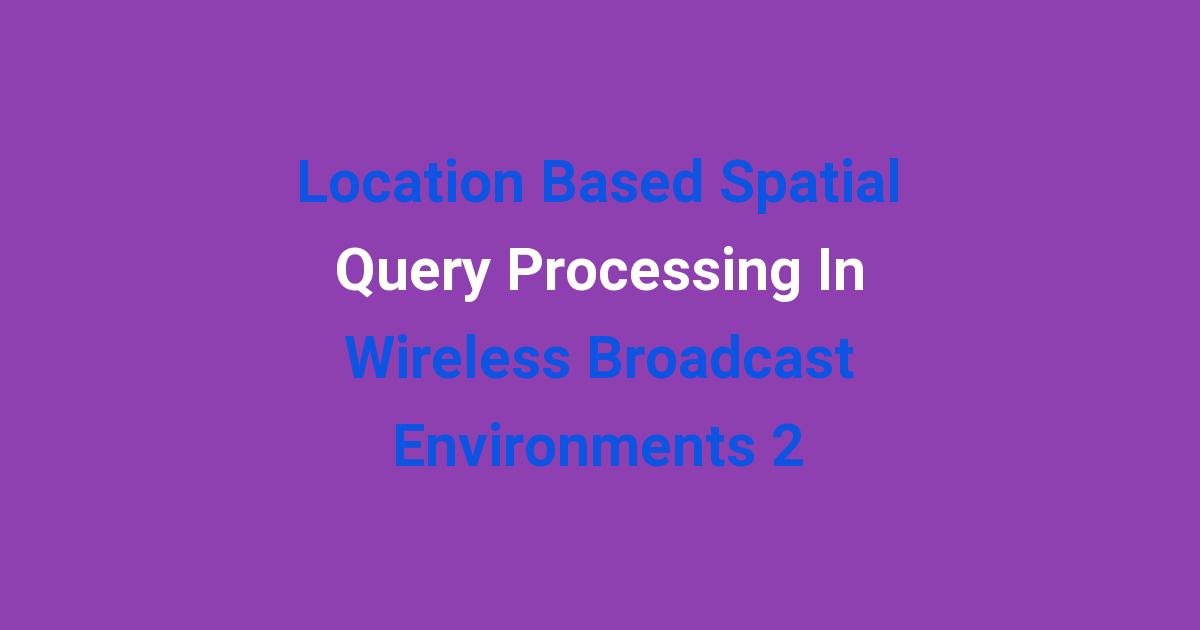Processing spatial queries based on location in wireless broadcast environments,
Location-Based Spatial Query Processing in Wireless Broadcast Environments
Introduction
In recent years, location-based services have gained significant popularity due to the widespread use of smartphones and other mobile devices. These services rely on the ability to process spatial queries efficiently in order to provide users with relevant and timely information based on their current location. In wireless broadcast environments, where multiple users access the same data simultaneously, the challenge lies in optimizing query processing to minimize the overhead on the network and improve overall system performance. This project aims to explore the existing systems for location-based spatial query processing in wireless broadcast environments and propose a new system to address their limitations.
Problem Statement
The current systems for location-based spatial query processing in wireless broadcast environments suffer from several limitations. One major issue is the high overhead on the network caused by frequent broadcasts of data to all users, regardless of their location or query requirements. This results in poor scalability and performance, especially in environments with a large number of users or high query rates. Additionally, existing systems may not efficiently utilize the resources available, leading to suboptimal query processing and slow response times for users. These limitations hinder the effectiveness of location-based services and undermine the user experience.
Existing System
The existing systems for location-based spatial query processing in wireless broadcast environments typically use a broadcast-based approach to disseminate data to all users. When a query is issued by a user, the system broadcasts the query to all nodes in the network, which then process the query locally based on their current location. While this approach ensures that all users receive the relevant data, it also leads to unnecessary data transmissions and processing overhead, particularly for users who are not within the query’s spatial scope. As a result, the system may experience congestion and delays in query processing, impacting the overall performance and user satisfaction.
Disadvantages
Some of the key disadvantages of the existing systems for location-based spatial query processing in wireless broadcast environments include:
– High network overhead: Frequent broadcasts of data and queries to all users lead to unnecessary data transmissions and processing overhead, impeding system performance.
– Poor scalability: The broadcast-based approach may not scale well in environments with a large number of users or high query rates, causing congestion and delays in query processing.
– Inefficient resource utilization: Existing systems may not effectively utilize the available resources, resulting in suboptimal query processing and slow response times for users.
– Limited spatial query optimization: The lack of efficient spatial query optimization techniques in the existing systems hinders the performance and responsiveness of location-based services.
Proposed System
To address the limitations of the existing systems, we propose a new system for location-based spatial query processing in wireless broadcast environments. The proposed system utilizes a location-aware query processing approach, where queries are processed based on the spatial proximity of users to the query location. Instead of broadcasting queries to all nodes in the network, the system selectively disseminates queries to nodes within the query’s spatial range, reducing unnecessary data transmissions and processing overhead. By leveraging location information, the proposed system can optimize query processing and improve the overall efficiency of location-based services.
Advantages
Some of the key advantages of the proposed system for location-based spatial query processing in wireless broadcast environments include:
– Reduced network overhead: By selectively disseminating queries based on location, the proposed system minimizes unnecessary data transmissions and processing overhead, enhancing system scalability and performance.
– Improved scalability: The location-aware query processing approach enables the system to scale effectively in environments with a large number of users or high query rates, ensuring smooth query processing and faster response times.
– Efficient resource utilization: The proposed system optimizes the utilization of resources by processing queries selectively based on spatial proximity, leading to improved query processing efficiency and user satisfaction.
– Enhanced spatial query optimization: Leveraging location information allows the system to optimize spatial queries effectively, improving the responsiveness and accuracy of location-based services.
Features
The proposed system for location-based spatial query processing in wireless broadcast environments offers several key features, including:
– Location-aware query processing: Queries are processed based on the spatial proximity of users to the query location, optimizing query processing and reducing network overhead.
– Selective query dissemination: Queries are selectively disseminated to nodes within the query’s spatial range, minimizing unnecessary data transmissions and processing overhead.
– Scalable architecture: The system is designed to scale effectively in environments with a large number of users or high query rates, ensuring efficient query processing and improved performance.
– Resource optimization: The system optimizes the utilization of resources by processing queries selectively based on spatial proximity, enhancing the overall efficiency of location-based services.
Conclusion
In conclusion, location-based spatial query processing in wireless broadcast environments is a critical aspect of providing effective and efficient location-based services to users. The existing systems for query processing suffer from limitations such as high network overhead, poor scalability, inefficient resource utilization, and limited spatial query optimization. The proposed system aims to address these limitations by leveraging a location-aware query processing approach, selective query dissemination, scalable architecture, and resource optimization. By implementing the proposed system, we can enhance the performance, scalability, and efficiency of location-based services, ultimately improving the user experience and satisfaction in wireless broadcast environments.

